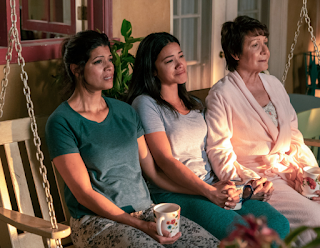Picturing a Telenovela
Like several other students in this class, I'm a fan of Jane the Virgin. I mean, how could I not be? It had insane plot twists, a perfect balance of fantasy and reality, and crazy romances that were, "straight out of a telenovela, right?" But apparently, Jane the Virgin is NOT a telenovela. At first, that assessment confused me. I had always pictured that show as a telenovela.
There were some other shows that I was surprised to find weren't telenovelas either; I'm a fan of Siempre Bruja, but it isn't a telenovela. Other titles, like Casa de Papel and Elite, also don't fit the bill. But, after a few lectures, I discovered the reason my picture of telenovelas was so flawed.
When I thought of telenovelas, I pictured drama, romance, cheesines, and most importantly, the Spanish language. It was the last descriptor that truly lead me astray. I assumed that all of the titles I listed previously were telenovelas because they were dramas with some Spanish. That's all you need to be a novela, right?
Definitely not.
By picturing telenovelas as simply dramas with Spanish, I was able to put them in a little box. However, finding out that Brazil was one of the leaders in telenovelas was a massive blow to that image. The prevalence of Portuguese novelas made me realize that telenovelas were far too diverse to fit in a tiny box.
If telenovelas were simply dramas in Spanish, then translating them to another language would mean that they were no longer telenovelas. However, Turkey, Brazil, and Korea are all producing novelas in their respective languages, which means that there's clearly something more.
So, what is my new picture of telenovelas?
Good question, because I have no idea. One thing's for sure: comparing telenovelas to other pieces of media don't do them justice. Telenovelas go by their own complex and nuanced laws that have been developed for decades. I understand that, and am at peace with diving into them with no point of reference.
Honestly, I don't think I should do it any other way.

Jane the Virgin was definitely a big reason why I chose this particular FYOS, but, like you, I was shocked to discover that it is just a series. It had the love triangle, THE antagonist (Petra's mom), its ups and downs, really anything you'd imagine a telenovela to be. With all these components, it raised such a broad question: what really makes a telenovela? I was completely unaware that they were made in other countries like Turkey and Korea and that they were not what one would call a soap opera. This seminar definitely informed us more and more about telenovelas that we have already become more appreciative of the production, history, and especially the cultures!
ReplyDeleteThis comment has been removed by the author.
DeleteHey Siena! I really enjoyed reading your blog post. I love Jane the Virgin as well - that scene when Jane found out Michael had died just hit different. Even though I grew up watching novelas my whole life, I never really knew what defined them. While I didn't think it was the only factor, I definitely also thought the Spanish language was a big marker. However, you made a great point: translating a novela to another language does not make it any less of the novela it originally was. Really enjoyed looking at your perspective coming into this class!
ReplyDeleteI absolutely adored "Jane the Virgin," but I also originally thought that it was considered a telenovela. I thought that it was a telenovela because of the Spanish language and because of the style of having a narrator narrate the show. I now know that although there are some similarities in "Jane the Virgin" with an actual telenovela like music style, language, plot style (the aspect of realism), and narrative style, it is not necessarily a telenovela. It is a westernized version of a telenovela because it blends cultures from the west and Latin America. It acts as a spin-off to the style of a telenovela, but is not a traditional telenovela. I know now that there are many defining aspects of a telenovela, including the time that it is broadcast, the number of episodes, the correlation between the actors and characters, and many more aspects. I think that it is important to understand the differences between telenovelas and other styles of films because it adds significance, speciality, and magic to a telenovela.
ReplyDelete